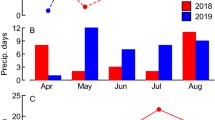Abstract
THE fact that at high temperatures, that is, between 30° and 40° C, the growth response of many plants to mineral deficiencies is strikingly altered does not appear to have been recorded. At these temperatures plants grown in sand cultures on a fully balanced mineral nutrient solution are appreciably smaller than ones grown on solutions lacking one essential trace element such as boron, copper, manganese, molybdenum or zinc, and this effect has been observed here for six seasons. This is the reverse of what is normally observed at more moderate temperatures, where the control tends to be the largest and healthiest plant in any experiment.
This is a preview of subscription content, access via your institution
Access options
Subscribe to this journal
Receive 51 print issues and online access
$199.00 per year
only $3.90 per issue
Buy this article
- Purchase on Springer Link
- Instant access to full article PDF
Prices may be subject to local taxes which are calculated during checkout
Similar content being viewed by others
Author information
Authors and Affiliations
Rights and permissions
About this article
Cite this article
SCHÜTTE, K. Inversion of Growth Patterns in Normal and Mineral-deficient Plants at High Temperatures. Nature 206, 528–529 (1965). https://doi.org/10.1038/206528b0
Issue Date:
DOI: https://doi.org/10.1038/206528b0
Comments
By submitting a comment you agree to abide by our Terms and Community Guidelines. If you find something abusive or that does not comply with our terms or guidelines please flag it as inappropriate.



